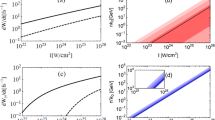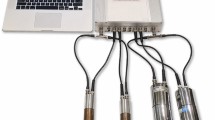Abstract
IN some recent experiments, I have measured the energy losses suffered by electrons of initially homogeneous speed in passing through nitrogen, the pressure of which was so chosen that no appreciable amount of multiple collisions should occur. The method consists in accelerating electrons from the hot cathode C into the field-free space bounded by A and B, where the collisions take place (Fig. 1). Those electrons which have not been deflected appreciably from the original direction of travel proceed through the perforated centre of B and through the narrow slit S1 enter the box D, where their speed is measured by means of a deflecting electric field between E and F and a box collector G, placed immediately behind the exit slit S2.
This is a preview of subscription content, access via your institution
Access options
Subscribe to this journal
Receive 51 print issues and online access
$199.00 per year
only $3.90 per issue
Buy this article
- Purchase on Springer Link
- Instant access to full article PDF
Prices may be subject to local taxes which are calculated during checkout
Similar content being viewed by others
References
Phys. Rev., vol. 34, pp. 284, 291; 1929.
Roy. Soc. Proc., A, vol. 127, p. 111; 1930.
Phys. Rev., vol. 31, p. 357; 1928.
Phys. Rev., vol. 33, p. 559; 1928.
Astrophys. J., vol. 68, p. 257; 1928.
Author information
Authors and Affiliations
Rights and permissions
About this article
Cite this article
RUDBERG, E. Single Collisions of Electrons in Nitrogen . Nature 126, 165–166 (1930). https://doi.org/10.1038/126165a0
Issue Date:
DOI: https://doi.org/10.1038/126165a0
Comments
By submitting a comment you agree to abide by our Terms and Community Guidelines. If you find something abusive or that does not comply with our terms or guidelines please flag it as inappropriate.



